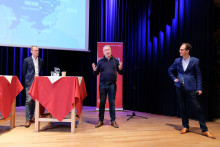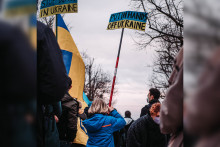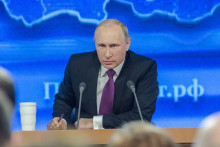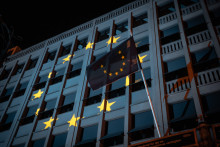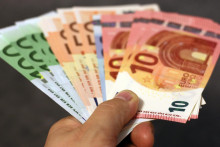Donnelly starts his breakdown with a retrospect of the attack on the Crimea bridge, little less over a week ago. ‘That attack had a tremendous military and symbolical impact and it really ramped up a sense of distress and panic for Putin. Crimea is a fortress and it’s of incredible strategic importance – and it has been for thousands of years. Since it’s in trouble, Putin will do whatever he can to resupply and reinforce before winter. Everyone knows that whoever controls Crimea, controls the region.’
Now that the Ukrainian army is in the process of retaking the city of Kherson, Donnelly thinks Putin has his back against the wall. ‘Losing Kherson and the south would be a bigger loss than losing the north and the initiative – which have both already happened. His geopolitical strategy has failed and he is losing this war. If he lets go of Crimea, he has lost entirely. If there is a hill to die on, it’s this one. And if you’re afraid of losing big, you can consider using nuclear weapons, to regain the initiative.’
Cuban missile crisis
According to the UT researcher, the current situation is very similar to the nuclear threat at the time of the Cuban missile crisis in 1962. ‘Could he do it? Yes. Would he do it? That depends on multiple factors. One of the reasons we still exist after 1962, is that both the leaders of the US and the USSR had a team of advisors, who looked at facts and scenarios. That is still the case on the American side, but it’s highly doubtful on Putin’s side. So it will come down to personal psychology: what will he do to save himself, physically and politically?’
The question is also: what would he attack? ‘A tactical nuke on military targets, I don’t see that happening. The Ukrainian troops are spread out too far for it to have a significant effect. But a city? I think that’s plausible. He has precision bombed primary schools, so I wouldn’t be surprised.’
Deterrence
There is another factor at play here, says Donnelly. ‘Maybe the most important one: deterrence – threatening with serious consequences in the case of an attack.’ Donnelly has seen two recent deterrence attempts from western countries. ‘Macron’s tweet, that was stupid. He basically said France won’t use any nuclear weapons.’
And then there was the response from the US. ‘That is deterrence, the US is likely to respond with advanced conventional weaponry, but that will still elicit responses and counter-responses that make a nuclear armageddon a very real possibility. Still, I also notice that the Americans are extremely cautious. They would rather see Russia bleed itself out, than deal out a deadly blow. They stick to sapping away the strength of the Russian army.’
But once the atomic bomb falls, what then? ‘Nobody knows, but I fear for the worst. What we know from strategic studies, is that once deterrence collapses, you are on a ladder of escalation. And that is a ladder that doesn’t stop.’


